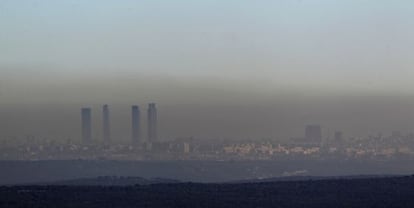Madrid dwellers fume in city poll
Capital slumps in Euro survey with pollution, noise and dirt as top gripes Opposition to PP mayor leaps on evidence that change is urgently needed

Quality of life in Madrid has declined in the last three years, or at least that is the way residents feel about it, according to a European Union study conducted in 83 cities. Compared with the rest, the Spanish capital occupies one of the last spots with regard to pollution levels, noise and cleanliness. There was a strong decline in citizen satisfaction on most aspects compared with 2009, the year of the previous study.
Overall, however, the survey found that in most cities, including Madrid, at least 80 percent of respondents said that they are satisfied to be living in their city. The Flash Eurobarometer, released last week, is based on 41,000 surveys conducted between November and December 2012 in all 28 EU member states, as well as Turkey, Iceland, Norway and Switzerland.
Forty-three percent of Madrileños reported satisfaction with street cleaning, down from 55 percent in 2009. It is a similar rate to Paris or Berlin, but behind London, where 67 percent of respondents were happy with their city's cleanliness. By comparison, 58 percent of Barcelona dwellers expressed satisfaction on this point. The Catalan capital also scored higher than Madrid on the perceived state of streets and buildings and pedestrian areas.
Barcelona scored higher on the state of streets and pedestrian areas
As for air quality, Madrid ranked third from last, with just 25 percent of those surveyed saying the quality was acceptable, compared with 31 percent in Barcelona. Still, this statistic has improved from 2009, when only 15 percent of Madrileños were comfortable with air pollution levels.
Noise is also an issue of concern in Madrid, which ranked next to last on the list of 28 cities, with 31-percent satisfaction levels (only Bucharest fared worse). Again, however, this aspect has improved since 2009, when just 16 percent were happy with noise levels.
Satisfaction did drop notably with regard to public education and transportation, which do not depend so much on the city as the regional government, both of which are ruled by the Popular Party (PP). Transportation satisfaction rates dropped from 78 percent to 68 percent, almost on a par with Barcelona (69 percent). But perhaps the greatest drop was in the feeling of safety, which declined abruptly from 87 percent in 2009 to 68 percent in 2012, although it is still within the average range for all European cities.
One figure that rose significantly was the rate of Madrileños who think that having foreigners in the city is a good thing: from 53 percent in 2009 it rose to 69 percent. The rate of city dwellers who feel that foreigners are well integrated also rose from 37 to 50 percent. What Madrileños truly cannot stand is city administrative services: only 39 percent believe them to be efficient, compared with 56 percent in London or 52 percent in Paris.
"The EU report unfortunately certifies the disastrous balance of years' worth of management devoted to fireworks rather than to solving citizens' problems," said the Socialist leader in Madrid, Jaime Lissavetzky, in reference to the decades of conservative rule and the three failed bids to host the Olympic Games. "I hope that this new rebuke will act as a reality check for the PP and that it will stop ignoring Madrid's urgent needs. This city can no longer wait, it can't take it anymore; it needs a new project under a new management with majority support."
Meanwhile, the left-wing United Left bloc said the EU study "confirms that you have the city that Mayor Ana Botella imagines, and then you have the city that citizens have to deal with; it's not that there are people, like she says, who want to convey an image of a decadent, abandoned Madrid. It's that her policy of budget cuts has turned the city into what the survey reflects. This is what a majority of citizens feel."
Earlier last month, Mayor Botella pointed to "vested interests" based on "political arguments" behind an in-depth story published in EL PAÍS about the decline of the city. That story considered the drop in tourist arrivals, the cuts to cultural events and cleaning services, and the mayor's lack of widespread popular support (she was not voted into office in local elections, but succeeded Alberto Ruiz-Gallardón when the latter left before the end of his term to become justice minister).
"Madrid also lacks a strong brand, a postcard image to identify it, an inspiring tale to attract world renown. This is a source of concern for authorities, and also for several civil groups, who are trying to change the city model," said that story.
Tu suscripción se está usando en otro dispositivo
¿Quieres añadir otro usuario a tu suscripción?
Si continúas leyendo en este dispositivo, no se podrá leer en el otro.
FlechaTu suscripción se está usando en otro dispositivo y solo puedes acceder a EL PAÍS desde un dispositivo a la vez.
Si quieres compartir tu cuenta, cambia tu suscripción a la modalidad Premium, así podrás añadir otro usuario. Cada uno accederá con su propia cuenta de email, lo que os permitirá personalizar vuestra experiencia en EL PAÍS.
¿Tienes una suscripción de empresa? Accede aquí para contratar más cuentas.
En el caso de no saber quién está usando tu cuenta, te recomendamos cambiar tu contraseña aquí.
Si decides continuar compartiendo tu cuenta, este mensaje se mostrará en tu dispositivo y en el de la otra persona que está usando tu cuenta de forma indefinida, afectando a tu experiencia de lectura. Puedes consultar aquí los términos y condiciones de la suscripción digital.








































